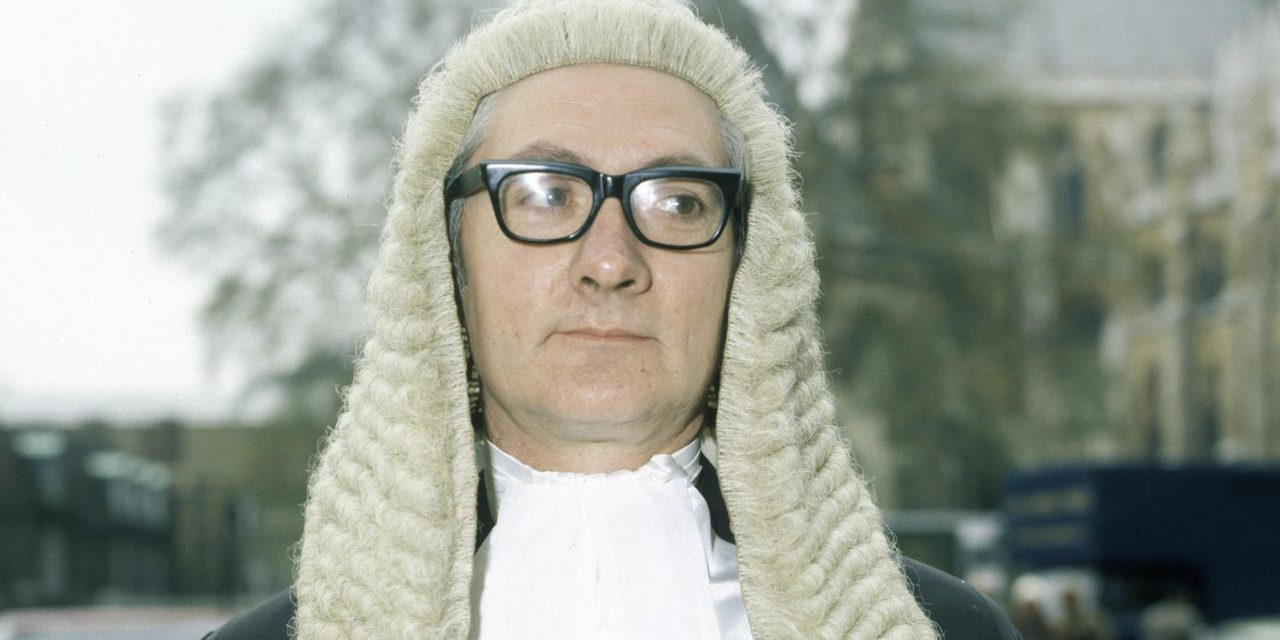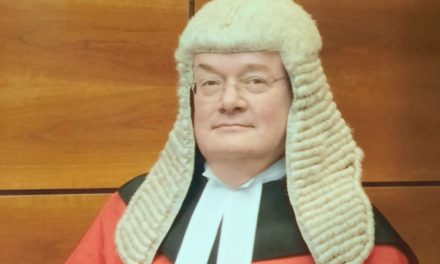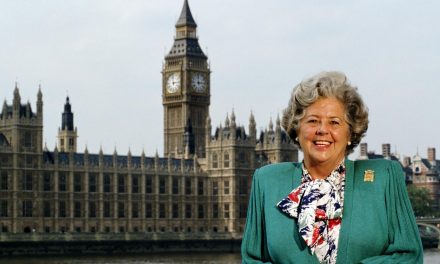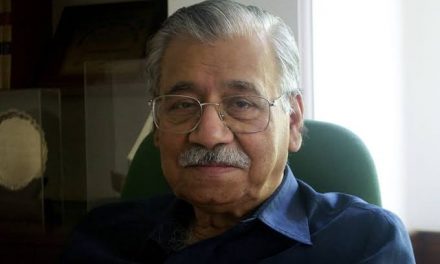Anthony Arlidge KC did not believe in the concept of evil until he met Jeremy Bamber. Arlidge was prosecuting in the infamous trial in which Bamber was accused of murdering his parents at their home, White House Farm in Essex, along with his sister and her twin six-year-old boys. Arlidge’s son John recalls: ‘My father thought Bamber was the embodiment of evil, which is quite something when you think of all the defendants he had met in his career.’
Arlidge secured Bamber’s conviction in what was a tricky case in which the killer had sought to frame his dead sister. ‘Before I was instructed,’ he later recounted, ‘I watched him at the funeral of his parents on TV and I thought he was faking his grief.’
That instinct coupled with exceptional skill as an advocate made Arlidge one of the pre-eminent criminal silks of his generation. Bamber was jailed for life in 1986 and would send Arlidge Christmas cards, insisting on his innocence and seeking Arlidge’s help in overturning the conviction. It was his most prominent trial in a career that spanned more than 50 years, both prosecuting and defending.
His other cases included defending Dr Howard Martin; a GP accused of killing patients with an overdose of morphine. Arlidge said that Martin offered him some medication one morning when the silk was under the weather: ‘I’m not having any of your f***ing pills,’ was his robust response. Again, he defied the odds, securing Martin’s acquittal in 2005. The GP was later struck off after admitting ‘hastening’ patients’ deaths.
Arlidge was a deft jury advocate: he spoke simply, in short sentences devoid of pomposity or Latin, and deployed his natural wit, even at the judge’s expense, to powerful effect. He had a theatricality of a kind rarely seen in the courts today. One retired criminal judge said: ‘He had the full apparatus: fine mind, work ethic, advocacy skills and charm. He was the last opponent one wanted, professionally. A jury ate out of his hand, and he was terrifyingly effective. If he prosecuted, he was deadly, too fair, too accommodating, too tuned in to the court. It made defending a nightmare.’
He liked most of his clients, believing they always had a redeeming quality. ‘I see no criminality here,’ he would say on perusing a case, meaning the alleged crime could not be proved. He got the gangster Andy Baker off several charges before the latter’s luck ran out. After one acquittal, Baker gave the QC profuse thanks. There was a long pause. Then he added: ‘I might be needing your services again in six to eight months’ time.’
Arlidge loved the challenge of intellectual combat, inside and out of court. He also sat as a recorder, but it was not for him. Non-judgmental, he believed in letting others get on with their lives. On one occasion, he was sentencing a woman at the Old Bailey who came up from the cells with her knickers on her head. Arlidge decided it best to ignore the provocation and carry on regardless.
There were other colourful episodes. He once cleared the Royal Courts of Justice when, at the height of IRA bomb threats, he left his bag in the robing room. Arlidge was on his way to make a film, Gone with the Nun (he was a keen amateur actor). His bag contained a cine camera, a nun’s habit and a maid’s costume. A member of court staff heard the ticking camera he had left running and all courts were evacuated. Police threatened to blow up the bag until Arlidge arrived to explain. As the bag was emptied of its costumes, the officer said: ‘We get a lot of your sort here, sir.’
Anthony (Tony or ‘Tone’) Arlidge was born in Sidcup, Kent, in 1937, the only son of Jack Arlidge, a teacher, and Doris (née Whitecross), who worked in the charitable sector. He won a scholarship to Sidcup Grammar, where he was a keen tennis player, playing in junior Wimbledon and for Kent, then went to Queens’ College, Cambridge, where he read law. His first wish was to be a ballet dancer, inspired by trips with his parents to Sadler’s Wells, but he then read a biography of the advocate Norman Birkett and decided: ‘That was for me.’
At Cambridge, he developed his love of acting and became friends with Ian McKellen and Julian Curry (Claude Erskine-Browne in Rumpole of the Bailey). An acting career was a serious possibility: the Bar’s gain was the stage’s loss, Curry once said. Law was a safer bet, but Arlidge never gave up his passion and performed in many productions at Middle Temple, where for 20 years he was Master of Entertainments, becoming Treasurer in 2003.
In those productions he collaborated with names such as Mark Rylance, Martin Shaw and Richard Griffiths. Similarly, in his work with the charity the Kalisher Trust he wrote and produced some fine staged readings. In one, he cast Lord Justice (Anthony) Hughes and dined out saying: ‘The hours I spent coaching him on his lines, the intonation, his stagecraft. What a diva. I wouldn’t mind but he only had to say, “court rise”. That’s all the usher does.’
On leaving Cambridge he obtained pupillage in a family set of chambers which he ‘hated’, but after six months went to 5 King’s Bench Walk, the set founded by Sir Frederick Lawton in 1949, which later moved to 18 Red Lion Court. He was given a tenancy and was made a silk in 1981, taking on many cases in crime, fraud, sport and medicine. In 1991, he led the team for most of the appellants in the successful Guildford Four challenge to their convictions. Big-league fraud cases included Blue Arrow and Marconi; and acting in 1993 in a £90 million fraud trial for Terry Ramsden, a racehorse owner. In 1995, he defended George Graham, manager of Arsenal, on corruption charges before an FA panel. Graham was found guilty of misconduct and sacked.
If Arlidge’s cases often made the headlines, so did his private life. He married Enid (‘Topsy’) Townsend in 1964, a teacher, and remained married to her long after they separated in 1991. They had four children: Catherine, a violinist with the City of Birmingham Symphony Orchestra and artistic director of the National Children’s Orchestras; John, a senior writer on The Sunday Times (whose partner is Stephanie Flanders, head of economics and government at Bloomberg); Vicky, a composer who has written extensively for TV and theatre and produced popular children’s albums; and Matthew, a crime fiction author and TV script writer. There are nine grandchildren.
After the separation, Arlidge had several relationships, including with Constance Briscoe, one of the first black women recorders and author of Ugly, which detailed the abuse she claimed to have suffered at the hands of her mother. Arlidge was supportive and toured south London with her to promote the book. They parted after 12 years in 2010 when Arlidge embarked on a relationship with Heather Lockwood, a barrister then working as a paralegal. She was 25 and he was in his seventies. The liaison caused a ripple of gossip through the Temple, with Briscoe describing it as ‘a bit ridiculous’. Briscoe was jailed in 2014 after being found guilty of lying in 2013 in defence of her friend Vicky Pryce. Pryce and her then husband, Chris Huhne MP, were facing perjury charges over a speeding fine that Pryce falsely accepted for Huhne. They were found guilty. Arlidge and Lockwood married in 2020.
Despite his talents, Arlidge was a modest, self-deprecating man who never forgot his ordinary background. At heart an iconoclast, he disliked the pompous aspects of the Bar and punctured self-importance whenever he could. Away from the courtroom or stage he also wrote or co-authored leading textbooks on contempt and fraud and, with Igor Judge, the former Lord Chief Justice, published Magna Carta Uncovered in 2014.
He never lost his zest for the law, the courts, its characters, nor a sense of irrepressible fun, right to his death. Judge Mark Lucraft, his friend and a former chief coroner of England and Wales, saw him two days before he died. Arlidge would joke with him: ‘I have the chief coroner as an executor to my will so at least they’ll be certain I’m dead.’
Anthony Arlidge KC was born on February 18, 1937. He died on January 27, 2023, aged 85.
Reproduced with kind permission from The Times





